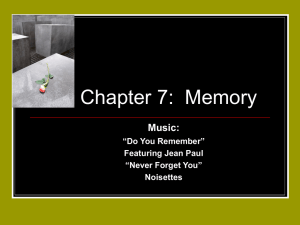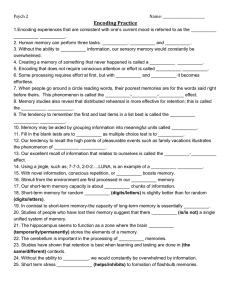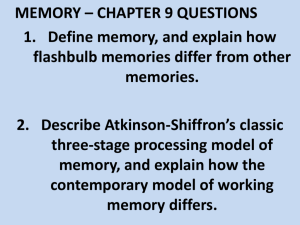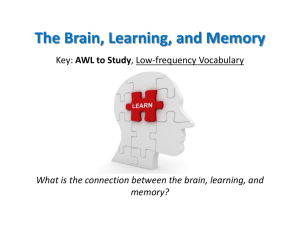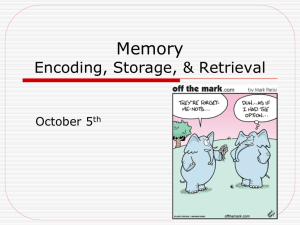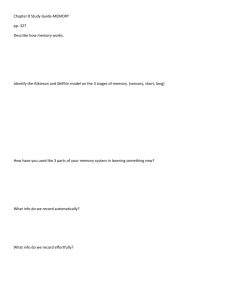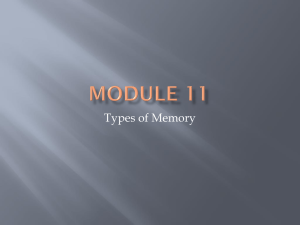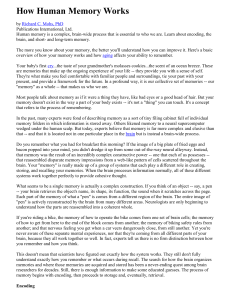Introduction to Psychology
advertisement
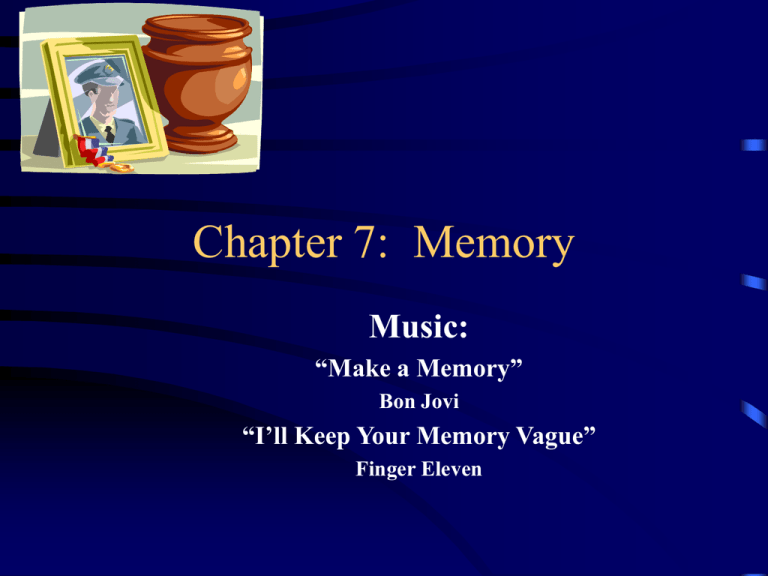
Chapter 7: Memory Music: “Make a Memory” Bon Jovi “I’ll Keep Your Memory Vague” Finger Eleven Memory: Agenda • 1. Remediation Plan – (i) Changes to the course – (ii) Additional help • 2. The Memory System • (i) Sensory Memory – • (ii) Short Term Memory – • From short-term to long-term memory (iii) Long Term Memory – • • • From sensory to short-term memory Forgetting 3. Eye-Witness Testimonies 4. Application: Improving your memory 5. Movie: “The Brain and Memory” (7 min.) 1. Remediation following the strike: (i) Changes to the course • Schedule: – February 3 – February 10 Memory Ch. 7 Thinking & Intelligence Ch. 8 and 9 » (except pgs. 311-325, 329-334, 344-345, 349-355, 375-387) – February 17 Test #2 Chapters 5-9 (except pgs. 311-325, 329-334, 344-345, 349-355, 375-387) – Final exam period for Fall courses • Feb. 20-March 3 – No exam in this course. – – – – Winter term resumes March 4 March 10 Motivation and Emotion Ch. 10, etc. April 14 Midterm #3 May 22-June 2 Final exam period • Evaluation: – Midterm #2 will be worth 10% or 20%, whichever works out best for you (final worth 31% or 41%) – The final exam is non-cumulative – URPP: You get 4% for 3 hours of research participation • See course outline from the course website: www.psych.yorku.ca/mongrain/teaching 1. Remediation following the strike: (ii) Additional help • Counselling and Development Centre for Emotional Help – See course website for links www.psych.yorku.ca/mongrain/teaching • Psychology drop-in centre 163 BSB – Questions addressed by faculty for Psych. Majors • Today and Wednesday until 7 p.m. • Thursday and Friday 1-4 p.m. • Tutorials for this course: – Review of academic material – Tuesdays 2:30-3:30 South Ross 122 – Wednesdays 10:30-11:30 Vari Hall 3006 • TAs are there to help you and clarify any questions! 2. The Memory System Fig. 7.7 p. 274 2. Three Key processes in Memory p. 268 2. (i) Sensory Memory • Stores a perfect picture of the world, but for a fraction of a second • See Sperling’s studies p. 274 • Iconic (visual) and echoic (auditory) sensory memories 2. (i) Sperling’s Studies p. 274 From Sensory to Short-Term Memory • How does information get encoded and transferred onto the memory system? • a) Automatic processing – No effort required • See implicit memories p. 296 • b) Effortful processing – Pay conscious effort and attention to hold info. In short-term memory • See explicit memories p. 296 2. (ii) Short-Term Memory • Semi-permanent storage • Magic number: 7 (+ - 2) • Information is lost after 20-30 seconds unless it is rehearsed • Maintenance rehearsal keeps the information there… • Elaborative rehearsal brings the information to long term memory • Type of encoding: p. 264-265 Type of Encoding • 2. (ii) Type of encoding, p. 270 2. (ii) From Short-Term to Long-Term Memory • What helps us remember?? • • • • a) Type of encoding b) Self-referent encoding (self-schema) c) Imagery d) Mnemonics: – method of loci – Acronyms: e.g. Roy G. Biv To long term memory… (cont’d) • e) Chunking: e.g. – 1-4-9-2-1-7-7-6-1-8-1-2 – (1492) (1776) (1812) • f) Organize information hierarchically • g) Spacing effects: – distributed practice leads to better long-term retention • h) Time: overlearning! • i) Mood-dependent effects 2. (iii) Long Term Memory Where information is stored in relatively permanent form Capacity is seemingly infinite! • 2 memory systems: p. 297 – Declarative: • Semantic (explicit memories/encyclopedia) • Episodic (implicit memories/autobiography) – Non-declarative, procedural • “how to”; implicit memories based on practice or habit • p. 297 2. (iii) Forgetting • Major reasons: – – – – a) failure to encode b) stored memories decay c) retrieval failure d) interference: • Proactive and retroactive (p. 289) – e) motivated forgetting: • Freud’s concept of repression – Repressed memory controversy – p. 290-293 2. (iii) Forgetting • The story of HM – Most famous and studied amnesiac • p. 295 2. (iii) Forgetting: Interference • p. 289 3. Eyewitness Testimony • A case of constructive memory – (discussed by professor in class) Conclusion: “Memories” for non-existent objects can be implanted Memory is surprisingly unreliable 4. Improving your Memory a) Pay Attention! And overlearn b) Distributed practice Take your time, and take time c) Engage in deep processing Make information personally meaningful Provide examples for yourself Link to previously acquired knowledge Efficient storage is key!! d) Organize information hierarchically e) Learn through several modalities E.g. use visual imagery (2 codes is better than 1) f) Use mnemonics (where useful) g) Minimize interference 5. Movie! “The Brain and Memory” Declarative memory involves the hippocampus and other structures in the medial temporal area of the brain. If that temporal area is destroyed due to injury or disease, people often develop amnesia. In this video you will learn how habit memory (procedural memory), a second robust but unconscious memory system plays a role in helping people with amnesia. (7 min.)
